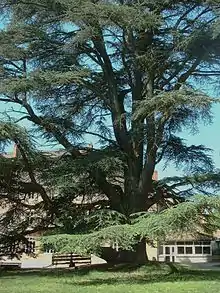cedar
English
Etymology
From Middle English cedre, probably from Old French cedre, from Latin cedrus, from Ancient Greek κέδρος (kédros).
Some suggest that the Middle English word was partially from Old English ċeder, but the gap in attestation between the two words makes this proposal unlikely.
Pronunciation
Noun
cedar (countable and uncountable, plural cedars)
- (countable) A coniferous tree of the genus Cedrus in the family Pinaceae.
- (countable) A coniferous tree of the family Cupressaceae, especially of the genera Juniperus, Cupressus, Calocedrus, or Thuja.
- 1912 January, Zane Grey, chapter 8, in Riders of the Purple Sage […], New York, N.Y., London: Harper & Brothers Publishers, →OCLC:
- There had been dry seasons, accumulations of dust, wind-blown seeds, and cedars rose wonderfully out of solid rock.
- (countable) A flowering tree of the family Meliaceae, especially of the genera Cedrela or Toona.
- (uncountable) The aromatic wood from a Cedrus tree, or from any of several not closely related trees.
Derived terms
- Alaska cedar, Alaska yellow cedar (Callitropsis nootkatensis)
- Atlantic cedar, Atlantic white cedar (Chamaecyparis thyoides)
- Atlas cedar (Cedrus atlantica)
- Australian red cedar (Toona ciliata)
- Barbados bastard cedar
- Barbados cedar (Juniperus barbadensis)
- bastard cedar*
- bay cedar*
- Bermuda cedar (Juniperus bermudiana)
- Brazilian cedar (Cedrela fissilis)
- British Columbian cedar
- Burma cedar (Toona ciliata)
- Bussaco cedar
- Californian white cedar
- Canary cedar
- Cape cedar
- cedar apple
- cedar-apple rust
- cedar ball
- Cedar Beach
- cedar beetle (Sandalus niger)
- cedar bird (Bombycilla cedrorum)
- Cedar Bluff
- Cedar Bluffs
- cedar camphor
- cedar chest
- Cedar City
- cedar closet
- Cedar County
- Cedar Crest
- cedared
- cedar elm (Ulmus crassifolia)
- Cedar Falls
- cedar fever
- Cedar Fire
- Cedar Forest
- Cedar Fort
- Cedar Glen Lakes
- Cedar Glen West
- cedar green, cedar-green
- Cedar Grove
- Cedar Hill
- Cedar Hill Lakes
- Cedar Hills
- Cedar Island
- Cedar Key
- Cedar Lake
- cedar leaf oil
- cedar-like
- cedar mahogany (Entandrophragma cylindricum)
- cedar marble
- Cedar Mill
- Cedar Mills
- Cedar Mountain
- cedarn
- cedar-nut
- cedar of Goa (Cupressus lusitanica)
- cedar of Lebanon
- cedar oil
- Cedar Park
- Cedar Rapids
- Cedar Revolution
- Cedar River
- cedar robe
- cedar shake
- cedar shingle
- cedar siding
- Cedar Springs
- cedar-swamp
- Cedartown
- Cedar Township
- Cedar Vale
- Cedar Valley
- cedar water
- cedar waxwing (Bombycilla cedrorum)
- cedar-wood, cedarwood
- cedar wood oil
- cedary
- Chilean cedar
- Chinese cedar
- cigar-box cedar
- Clanwilliam cedar (Widdringtonia wallichii)
- coast white cedar
- Cyprus cedar
- deodar cedar
- Dominica cedar
- east African cedar (Juniperus procera)
- eastern red cedar (Juniperus virginiana)
- East Indian cedar
- false cedar
- Goa cedar
- ground cedar
- Himalayan cedar
- Honduras cedar
- incense cedar
- Indian cedar (Toona ciliata)
- Jamaica cedar
- Japan cedar, Japanese cedar (Cryptomeria japonica)
- Lawson's cedar
- Lebanon cedar
- Mexican cedar
- Milanji cedar
- Mlanje cedar
- Moulmein cedar (Toona ciliata)
- Mulanje cedar
- Nootka cedar (Callitropsis nootkatensis)
- oil of cedar
- Oregon cedar (Chamaecyparis lawsoniana)
- Oregon white cedar
- pencil cedar
- pencil-wood cedar
- Philippine cedar
- Port Orford cedar
- Port Orford white cedar (Chamaecyparis lawsoniana)
- prickly cedar
- Queensland red cedar (Toona ciliata)
- red Australian cedar
- red Californian cedar
- red cedar*, redcedar
- Russian cedar
- salt cedar (Tamarix spp.)
- Siberian cedar
- Singapore cedar
- southern red cedar
- southern white cedar
- Spanish cedar
- stink cedar*
- stinking cedar (Torreya taxifolia)
- Texas cedar elm (Ulmus crassifolia)
- true cedar
- Turkish cedar
- Virginia red cedar
- water cedar
- West Indian cedar (Cedrela tonduzii)
- white cedar*, whitecedar
- yellow cedar (Callitropsis nootkatensis)
- See entry for additional derived terms
Related terms
- cedr-
- Cedrela
- cedrelaceous
- cedrelate
- cedrine
Translations
coniferous tree in genus Cedrus
| ||||||
coniferous tree in family Cupressaceae
|
aromatic wood
|
Ido
Pronunciation
- IPA(key): /t͡seˈdar/
Verb
cedar (present tense cedas, past tense cedis, future tense cedos, imperative cedez, conditional cedus)
- (transitive) to cede
Conjugation
Conjugation of cedar
 |
present | past | future | ||||
|---|---|---|---|---|---|---|---|
| infinitive | cedar | cedir | cedor | ||||
| tense | cedas | cedis | cedos | ||||
| conditional | cedus | ||||||
| imperative | cedez | ||||||
| adjective active participle | cedanta | cedinta | cedonta | ||||
| adverbial active participle | cedante | cedinte | cedonte | ||||
| nominal active participle | singular | cedanto | cedinto | cedonto | |||
| plural | cedanti | cedinti | cedonti | ||||
| adjective passive participle | cedata | cedita | cedota | ||||
| adverbial passive participle | cedate | cedite | cedote | ||||
| nominal passive participle | singular | cedato | cedito | cedoto | |||
| plural | cedati | cediti | cedoti | ||||
Latin
Pronunciation
- (Classical) IPA(key): /ˈkeː.dar/, [ˈkeːd̪är]
- (modern Italianate Ecclesiastical) IPA(key): /ˈt͡ʃe.dar/, [ˈt͡ʃɛːd̪är]
Verb
cēdar
- inflection of cēdō:
- first-person singular future passive indicative
- first-person singular present passive subjunctive
Serbo-Croatian
Etymology
(This etymology is missing or incomplete. Please add to it, or discuss it at the Etymology scriptorium.)
Declension
Derived terms
- cȅdrovina
This article is issued from Wiktionary. The text is licensed under Creative Commons - Attribution - Sharealike. Additional terms may apply for the media files.
